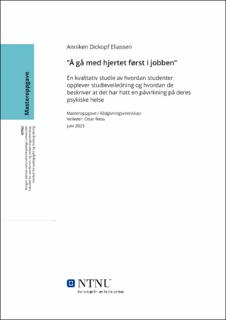Å gå med hjertet først i jobben
Master thesis
Permanent lenke
https://hdl.handle.net/11250/3078102Utgivelsesdato
2023Metadata
Vis full innførselSamlinger
Sammendrag
Denne masteroppgaven har undersøkt hvordan studenter opplever studieveiledning i høyere utdanning og hvordan de opplever at studieveiledningen har hatt en påvirkning på deres psykiske helse. Med tanke på en økende statistikk fra studentens helse- og trivselsundersøkelse (SHoT) blant studenter som strever psykisk, er dette et viktig tema å rette oppmerksomhet mot. Ettersom at studieveiledere har en sentral rolle når det kommer til å ha kontakt og møte studentene, kan det være tenkelig at deres hjelp kan ha en innvirkning på studentenes psykiske helse. Det er ikke mye forskning på akkurat hva studentene opplever som virkningsfullt i studieveiledning. Derfor ønsket jeg å undersøke nettopp dette. Studien søker derfor å svare på problemstillingen: «Hvordan opplever studenter studieveiledning og hvordan beskriver de at det har hatt en påvirkning på deres psykiske helse?».
Det ble samlet inn data gjennom en kvalitativ intervjustudie, hvor jeg gjennomførte semistrukturerte intervjuer av fem deltakere som enten var nåværende eller tidligere student ved et universitet eller en høyskole i Norge. Etter at intervjuene var gjennomført, valgte jeg å gjøre en tematisk analyse av datamaterialet. Her identifiserte jeg tre hovedtemaer: (1) Å bli møtt, sett og hørt som menneske, (2) Relasjonell balansekunst mellom å være nyttig og støttespiller, og (3) En veileder som ser det positive fremfor begrensningene.
I diskusjonen ble funnene diskutert i lys av teori og tidligere forskning. Det teoretiske grunnlaget for oppgaven er blant annet knyttet til personsentrert veiledning, arbeidsalliansen, relasjonskompetanse og salutogenese. Av diskusjonens hovedpoenger kan det trekkes frem viktigheten av at studentene blir møtt, sett og hørt i relasjonen. I tillegg diskuteres det hva studentene opplevde som virkningsfull og betydningsfull hjelp. Videre belyser oppgaven studieveilederes evne til å ha et positivt og løsningsorientert perspektiv i møte med studentene, og hvordan det påvirket den psykiske helsen deres. Hvor det stilles spørsmål om det kan forventes at studieveiledning skal være en arena som kan fremme en god psykisk helse. Ytterligere blir studieveilederes kompetanse og spørsmålet om en kompetanseheving diskutert.
Basert på funnene argumenterer jeg for at studieveiledere kan ha en viktig rolle og betydning for studentene, og deres psykiske helse. For ved å ha en relasjonell balansegang mellom å være nyttig og støttende, kan det ha en stor betydning for både fullføring av studiet, en økende mestringstro og trivsel i studietilværelsen. I tillegg viser denne studien at uavhengig av hjelpens tematikk, har alle et behov om å bli møtt, sett og hørt i veiledning.
Nøkkelord: «studieveiledning», «psykisk helse», «relasjon», «kompetanseheving». This master’s thesis has examined how students experience study counselling in higher education and how they perceive that study counselling has influenced their mental health. Considering the increasing statistics from the Student Health and Wellbeing Survey (SHoT) among students struggling with mental health issues, this is an important topic to focus on. Since study counselors play a central role in having contact and meeting students, it is conceivable that their help can have an impact on students’ mental health. There is a paucity of research exploring students’ perspectives on the efficacy of study counselling, which is why I wanted to investigate this specifically. Therefore, the study seeks to answer the research question: “How do students experience study counselling, and how do they describe its impact on their mental health?”.
Data was collected through a qualitative interview study, where I conducted semi-structured interviews with five participants who were either current or former students at a university or college in Norway. After the interviews were conducted, I chose to perform a thematic analysis of the data. I identified three main themes: (1) Being met, seen and heard as a person, (2) Relational balance between being helpful and supportive, and (3) A counselor who focuses on the positive rather than limitations.
In the discussion, the findings were discussed in light of theory and previous research. The theoretical foundation of the thesis is related to person-centered counselling, the working alliance, relational competence, and salutogenesis, among others. One of the main points of the discussion emphasizes the importance of students being met, seen, and heard in the relationship. Additionally, it discusses what the students experienced as effective and meaningful help. Furthermore, the thesis highlights the study counselor’s ability to have a positive and solution-oriented perspective when meeting with students and how it affected their mental health. It raises the question of whether student counselling can be expected to be an arena that can promote good mental health. Additionally, the study discusses the competence and ability of study counselors to balance being helpful and supportive, and the question of competence enhancement are also discussed.
Based on the findings, I argue that student counselor can play a crucial role in supporting students’ mental health and well-being. By maintaining a relational balance between being helpful and supportive, it can have a significant impact on both completing their studies, increasing their self-efficacy, and overall well-being in their student life. Additionally, this study shows that regardless of the thematic context of the assistance, everyone has a need to be met, seen, and heard in counselling.
Keyword: “study counselling”, “mental health”, “relationship”, “competence enhancement”
